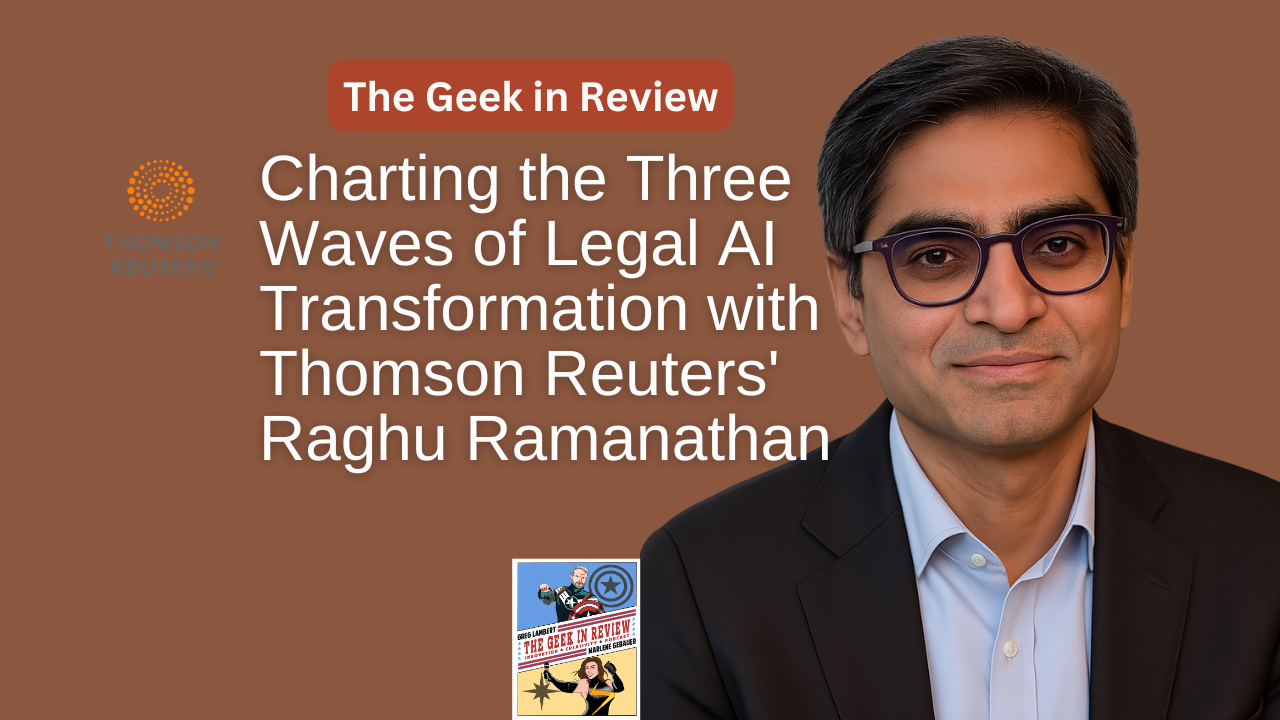In this episode of The Geek in Review, we welcome back Pablo Arredondo, VP of CoCounsel at Thomson Reuters, along with Joel Hron, the company’s CTO. The conversation centers on the recent release of ChatGPT-5 and the rise of “reasoning models” that go beyond traditional language models’ limitations. Pablo reflects on his years of tracking neural net progress in the legal field, from escaping “keyword prison” to the current ability of AI to handle complex, multi-step legal reasoning. He describes scenarios where entire litigation records could be processed to map out strategies for summary judgment motions, calling it a transformative step toward what he sees as “celestial legal products.”
Joel brings an engineering perspective, comparing the legal sector’s AI trajectory to the rapid advancements in AI developer tools. He notes that these tools have historically amplified the skills of top performers rather than leveling the playing field. Applied to law, he believes AI will free lawyers from rote work and allow them to focus on higher-value decisions and strategy. The discussion shifts to Deep Research, Thomson Reuters’ latest enhancement for CoCounsel, which leverages reasoning models in combination with domain-specific tools like KeyCite to follow “breadcrumb trails” through case law with greater accuracy and transparency.
The trio explores the growing importance of transparency and verification in AI-driven research. Joel explains how Deep Research provides real-time visibility into an AI’s reasoning path, highlights potentially hallucinated citations, and integrates verification tools to cross-check references against authoritative databases. Pablo adds historical and philosophical perspective, likening hallucinations to a tiger “going tiger,” stressing that while the risk cannot be eliminated, the technology already catches a significant number of human errors. Both agree that AI tools must be accompanied by human oversight and well-designed workflows to build trust in their output.
The conversation also delves into the challenges of guardrails and governance in AI. Joel describes the balance between constraining AI for accuracy and keeping it flexible enough to handle diverse user needs. He introduces the concept of varying the “leash length” on AI agency depending on the task—shorter for structured workflows, longer for open-ended research. Pablo challenges the legal information community to break down silos between disciplines like eDiscovery, research, and litigation, envisioning a unified information ecosystem that AI could navigate seamlessly.
Looking to the future, Joel predicts that the adoption of AI agents will reshape organizational talent strategies, elevating the importance of those who excel at complex decision-making. Pablo proposes “ambient AI” as the next frontier—intelligent systems that unobtrusively monitor legal work, flagging potential issues instantly, much like a spellchecker. Both caution that certain legal tasks, especially in judicial opinion drafting, warrant careful consideration before fully integrating AI. The episode closes with practical insights on staying current, from following AI researchers on social platforms to reading technical blogs and academic papers, underscoring the need for informed engagement in this rapidly evolving space.
Listen on mobile platforms: Apple Podcasts | Spotify | YouTube
[Special Thanks to Legal Technology Hub for their sponsoring this episode.]
Blue Sky: @geeklawblog.com @marlgeb
Email: geekinreviewpodcast@gmail.com
Music: Jerry David DeCicca
Guest’s Go-To Resources:
- Academic Papers:
Weekly research for trends.
scholar.google.com,
ssrn.com,
arxiv.org
- François Chollet: Balanced AI insights.
- Jason Wei (OpenAI): Reinforcement learning updates.
- Geoffrey Hinton: AI research insights.
x.com/geoffreyhinton - Richard Sutton: Reinforcement learning and philosophical takes.
incompleteideas.net
Reinforcement Learning: An Introduction (Book):
http://incompleteideas.net/book/RLbook2020.pdf
Seminal work by Turing Award winner. - University of Alberta Lab: https://rlai-lab.github.io
Current research on scalable AI methods.
Blue Sky: @geeklawblog.com @marlgeb
Email: geekinreviewpodcast@gmail.com
Music: Jerry David DeCicca









